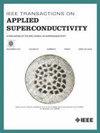Effects of Transverse Compressive Stress on CORC Cables Under Various Mechanical Support Conditions
IF 1.7
3区 物理与天体物理
Q3 ENGINEERING, ELECTRICAL & ELECTRONIC
引用次数: 0
Abstract
CORC ReBCO cables are promising conductors for the next generation of high-performance cables for high-field accelerator magnets. However, because significant mechanical stress is inevitable in high field magnet applications, the deformation and damage of these cables under large stresses should be explored. Focusing on high field accelerator dipole inserts for a moment, various mechanical configurations for the winding are under consideration, which may affect cable performance. Therefore, the relationship between mechanical support conditions and the mechanical performance of CORC ReBCO cable under transverse compressive stress should be explored. In this study, the effects of transverse pressure on CORC cables with either side support during pressure application, or epoxy impregnation, or both, were investigated. Several segments of a particular CORC cable were used in four different mechanical configurations; (i) as received, (ii) unpotted but with side support, (iii) potted without side support, and (iv) potted and with side support. A material Testing System (MTS model 43) was utilized to compress our samples up to 30 kN in four different supporting conditions as listed above. Samples were autopsied using optical as well as scanning electron microscopy after the completion of the mechanical tests. As a result, we found that the support conditions enhance the mechanical performance of the CORC cable by extending the elastic-plastic transition load to a larger stress level, and we also observe cleavage cracks after the completion of the compressive stress test.不同机械支护条件下CORC索横向压应力的影响
CORC ReBCO电缆是下一代高场加速器磁体高性能电缆的有前途的导体。然而,由于在高磁场磁体应用中不可避免地存在显著的机械应力,因此应探讨这些电缆在大应力下的变形和损伤。暂时关注高场加速器偶极子插入,考虑绕组的各种机械配置,这可能会影响电缆的性能。因此,应探讨在横向压应力作用下,机械支护条件与CORC - ReBCO索力学性能之间的关系。在本研究中,研究了施加压力、环氧树脂浸渍或两种情况下,横向压力对两侧支撑的CORC电缆的影响。在四种不同的机械结构中使用特定的CORC电缆的几个部分;(i)已接收,(ii)未装罐但有侧面支撑,(iii)没有侧面支撑的装罐,(iv)装罐并有侧面支撑。使用材料测试系统(MTS模型43)在上述四种不同的支撑条件下压缩样品至30 kN。在完成机械测试后,使用光学和扫描电子显微镜对样品进行解剖。结果表明,支护条件通过将弹塑性过渡载荷扩展到更大的应力水平来提高CORC索的力学性能,并且在压应力测试完成后,我们还观察到解理裂纹。
本文章由计算机程序翻译,如有差异,请以英文原文为准。
求助全文
约1分钟内获得全文
求助全文
来源期刊

IEEE Transactions on Applied Superconductivity
工程技术-工程:电子与电气
CiteScore
3.50
自引率
33.30%
发文量
650
审稿时长
2.3 months
期刊介绍:
IEEE Transactions on Applied Superconductivity (TAS) contains articles on the applications of superconductivity and other relevant technology. Electronic applications include analog and digital circuits employing thin films and active devices such as Josephson junctions. Large scale applications include magnets for power applications such as motors and generators, for magnetic resonance, for accelerators, and cable applications such as power transmission.
 求助内容:
求助内容: 应助结果提醒方式:
应助结果提醒方式:


